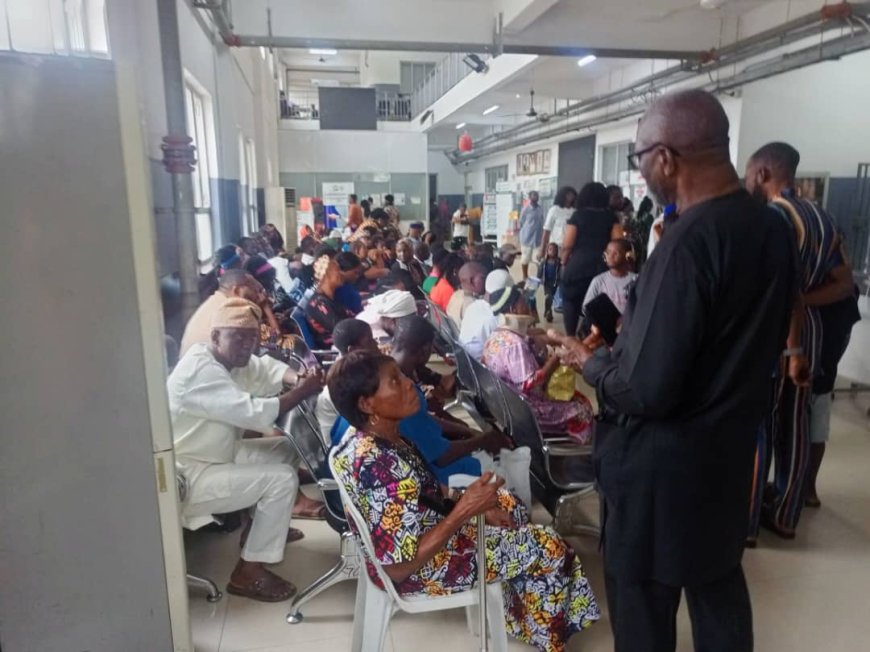Nurses’ strike: Abuja hospitals discharge patients

Hospitals across the Federal Capital Territory were thrown into chaos on Wednesday as nurses under the National Association of Nigeria Nurses and Midwives, Federal Health Institutions Sector, began a seven-day warning strike.
The action, which commenced early Wednesday, forced several government hospitals in Abuja to either discharge patients or drastically scale down operations due to an acute shortage of nursing staff.
The union had earlier, on July 14, 2025, issued a 15-day ultimatum to the Federal Government, demanding immediate intervention to avert a total healthcare shutdown.
According to the National Chairman of NANNM-FHI, Morakinyo Rilwan, the Federal Government failed to act within the given timeframe.
Among the key demands of the nurses are the upward review of shift allowance, adjustment of uniform allowance, creation of a separate salary structure for nurses, increase in core duty allowance, mass employment of nurses, and the establishment of a nursing department within the Federal Ministry of Health, among others.
The nurses maintain that the ongoing warning strike is necessary to press home these demands.
A visit by our correspondent to the Federal Medical Centre, Abuja, revealed slow medical services as patients waited for hours to be attended to.
Long queues were observed at the General Out-Patient Department, Immunisation Section, Consultation Section, and Surgical Out-Patient Department.
Executives of NANNM were also present at the hospital to monitor compliance with the strike directive.
The NANNM Chairman at the medical centre, Victor Asu, confirmed that no nurse was on duty.
Asu said, “I am here today to ensure absolute compliance. Although doctors and other healthcare workers are not on strike, services have become slow, and patients are already complaining.
” I went to the Intensive Care Unit, and there is a patient agitating to be discharged.
“We have resolved that no member will attend to patients in the wards or stay with them overnight. Normally, nurses provide 24/7 care, but for now, we are fully on strike.”
Abu Isah, who brought his father to FMC, said they arrived at 8 am and were still waiting after two hours.
The roll call is slow, but we remain hopeful we will get the care we need,” he said.
A mother, who does not want to be named, lamented the hours of waiting after bringing her daughter for immunisation.
“The staff here are attending to us, but the long wait is frustrating, and I still need to go to the office,” she said.
Also, at the General Hospital, Kubwa, nurses completely deserted the facility, leaving patients to overwhelm the hospital.
Critical services at the government-owned hospital were either skeletal or entirely shut down.
In the paediatric ward, many parents sat on benches clutching their children, while others stood anxiously in long queues.
A parent who declined to be named said, “It’s only the doctors attending to the children.
The pace is painfully slow because they don’t have nurses to assist them. The government should listen to these nurses and meet their demands. This situation clearly shows how difficult it is for doctors to function effectively without the nurses.
“Beyond diagnosing and prescribing, who will care for the admitted patients? Who will take vital signs or handle the basic tasks that nurses normally manage? Expecting doctors to do all that will only overwhelm them.
“The government needs to act quickly. Not everyone can afford private hospitals, and we are the ones suffering.”
At the labour ward of the hospital, patients were discharged earlier in the day, as doctors struggled to keep the ward running in the absence of nurses.
A doctor who requested anonymity admitted, “We’re overwhelmed. Without the nurses, our capacity is extremely limited. We can only offer basic care, but beyond that, our hands are tied.”
Meanwhile, at the National Hospital, Abuja, the impact of the strike was evident.
Patients crowded the waiting areas, many of them sitting on the floor or leaning against the walls, anxiously waiting to be attended to.
With no nurses available, doctors and other healthcare workers were left to handle tasks usually performed by nurses, resulting in painfully slow medical services.
Relatives of patients expressed their frustration over the long delays.
However, despite the challenges, many patients chose to remain, fearing their conditions might worsen if they left without receiving care.
The Chairman of NANNM at the hospital, Joe Akpi, warned that if their demands were not met at the end of the seven-day warning strike, the union would issue a fresh 21-day ultimatum, after which they would embark on a nationwide indefinite strike.
“In as much as we care about the patients, there is nothing we can do. There is an ongoing meeting, but it has been postponed to Friday,” he added.
At Wuse General Hospital, patients in the Accident and Emergency Unit were discharged due to the inability of doctors to cope alone.
A patient at the hospital, Simon Adebiyi, said, “The doctors are doing their best, but it’s far from enough. We are tired of the unusually long wait, and other people are tired too.”
cupped from Punch .

 admin
admin 


